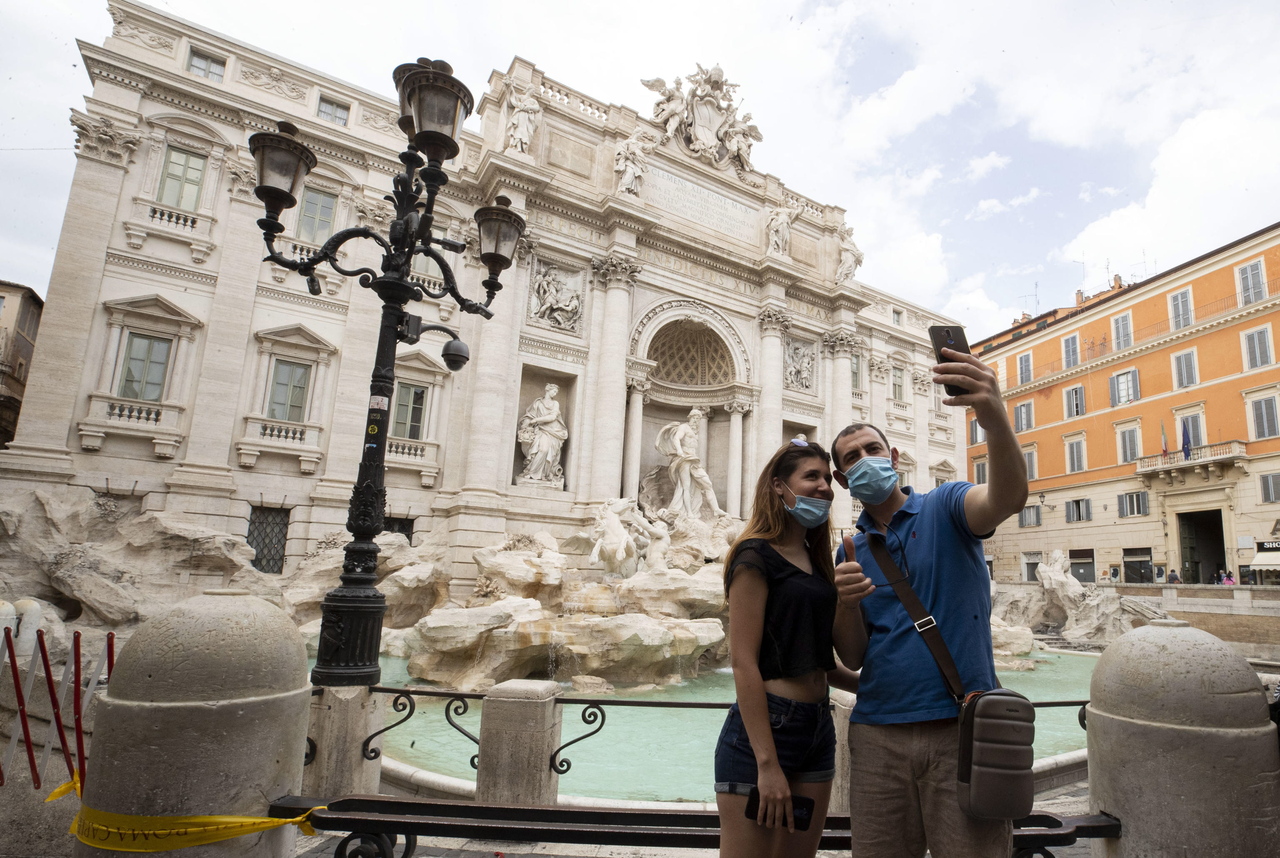Europe seeking ways to revive tourism after coronavirus lockdown
Sign up now: Get ST's newsletters delivered to your inbox

Tourists take a selfie in front of Trevi Fountain in Rome, on May 18, 2020.
PHOTO: EPA-EFE
LONDON - Europe, the world's biggest tourist destination, is struggling to restart normal life after months of total economic and social lockdown in response to the coronavirus pandemic.
In the next few weeks, cafes and restaurants are due to open in most European countries, and hotels and beaches are scheduled to follow suit by mid-June.
Still, most European governments acknowledge that their tourism industry will suffer badly this year. It will be some time before Europe can reclaim its place as the destination of choice for about half of the world's tourists.
Tourism is big business everywhere in Europe, from the "mature" markets of the western parts of the continent to the more exotic and often unchartered natural and cultural riches of central and eastern Europe which only became accessible to mass global tourism a few decades ago.
But tourism is particularly critical to the economies of nations on the continent's southern shores, countries such as Spain, France, Italy and particularly to Greece, where no less than a quarter of the national economy and one in five of all jobs are directly dependent on the tourism industry.
And in most of these countries, tourism is not just an economic proposition; it is often the only source of employment for the less skilled and remains key to sustaining rural communities in remote places which would otherwise have no other means of support.
The scattered sparse settlements on Greece's islands, for instance, or the small picturesque villages in Spain or Italy would be in real trouble without their tourism income.
Europe's tourism industry as a whole is estimated to be worth around €1.85 trillion (S$2.87 trillion) each year. And most of it simply vanished over the past few months.
The European Commission, the European Union's executive body, remains uncertain on how to encourage the sector's revival, either among Europeans themselves who account for around a third of all tourist trips inside the continent, or to prospective visitors from outside Europe.
"Wait before making plans" is what Dr Ursula von der Leyen, the Commission's President, advised last month, at a critical moment when many Europeans traditionally make their summer holiday bookings.
The Commission has since changed its mind, and last week published a set of proposals on how to implement social distancing in holiday resorts in order to prevent infections.
These included advice to hotel owners on hygiene measures, as well as suggestions that holiday resorts should abolish buffet lunches and dinners in order to avoid contamination, and stagger sessions at swimming pools or beaches.
Yet these were dismissed as "farcical" by the European Tours Operators' Association, one of the continent's professional bodies, largely because they do nothing to address the fundamental problem facing the sector, which is a lack of any consensus on how to revive the industry.
All airlines are operating at only a fraction of their previous capacity, and given some of the unfortunate instances of coronavirus infections, the leisure cruise industry is at a standstill.
More significantly, many borders in Europe are shut, and quarantine regulations remain contradictory.
France introduced quarantine requirements on all, only to relent and then exempt EU citizens from the need to observe them. Spain still insists on quarantining anyone coming in.
But Britain, which had no health restrictions at port and airports at the height of the pandemic, is now proposing to introduce strict quarantine requirements. Given this legal maze, it is not surprising that few people are prepared to book any holidays.
Instead, what Europe is witnessing is the emergence of "tourism bubbles", as a number of countries band together to facilitate their own tourism sector.
The small three Baltic states of Estonia, Latvia and Lithuania in northern Europe have created such a "bubble", inside which residents can move freely.
So has Germany, the Czech Republic and Austria in central Europe, "countries which are as successful as us", boasts Austrian Chancellor Sebastian Kurz.
Meanwhile, Greece and Croatia, major destinations in southern Europe, are toying with issuing "Covid-19 Passports", allowing their residents free movement.
Some operators are resorting to innovative measures to reassure customers that their holidays will be safe.
Accor, a French large hotel chain, is partnering with an insurance company to offer instant online medical consultation to customers who may fall ill during their hotel stays.
And low-cost airline companies in Europe are beginning to advertise some flights within the continent, with larger national carriers planning to restart their schedules sometime in July.
"France must remain standing on the podium," said Mr Jean-Baptiste Lemoyne, France's Tourism Minister, who vowed to restore his country's tourism sector.
That will be a tall order, even for France, the world's most visited country.


